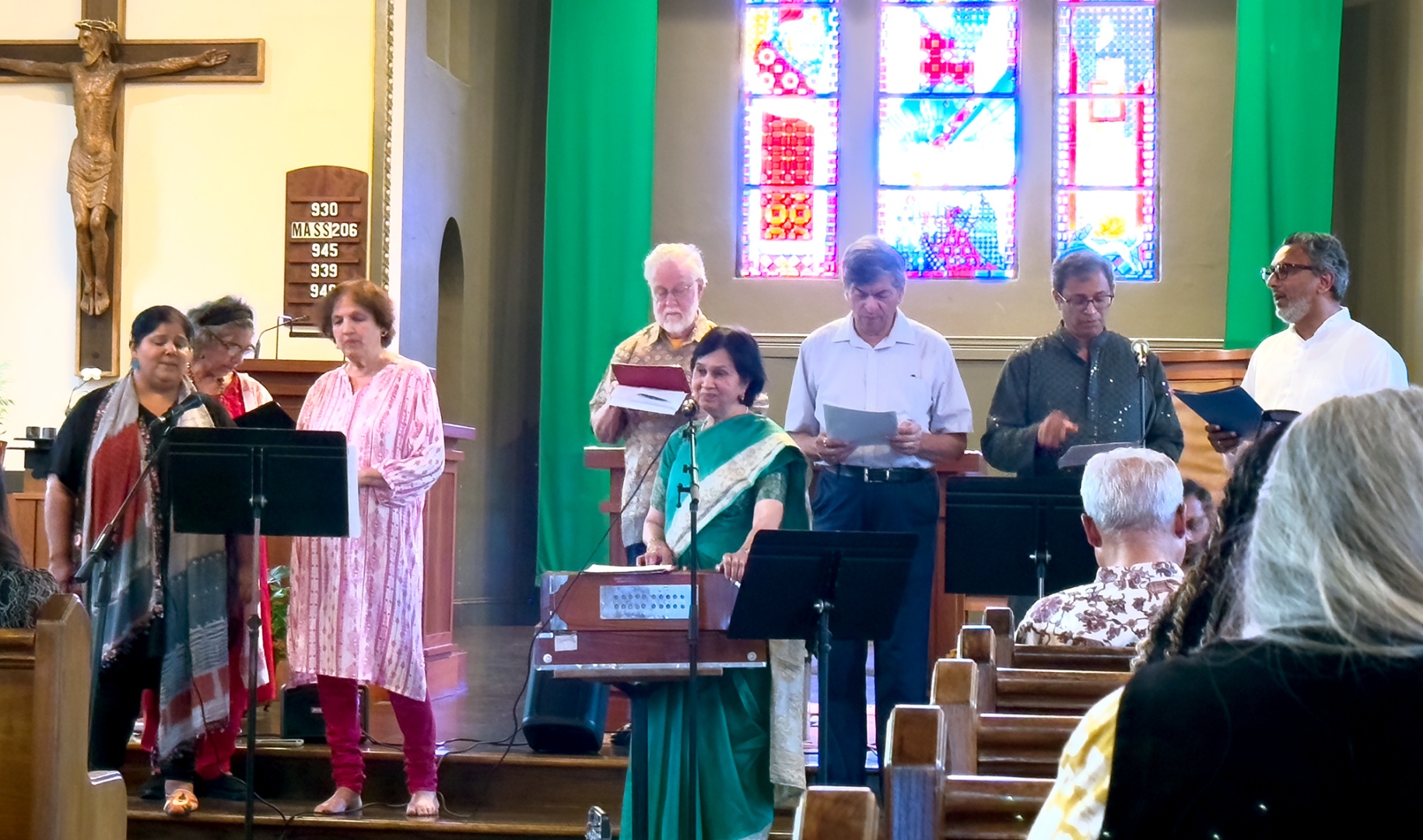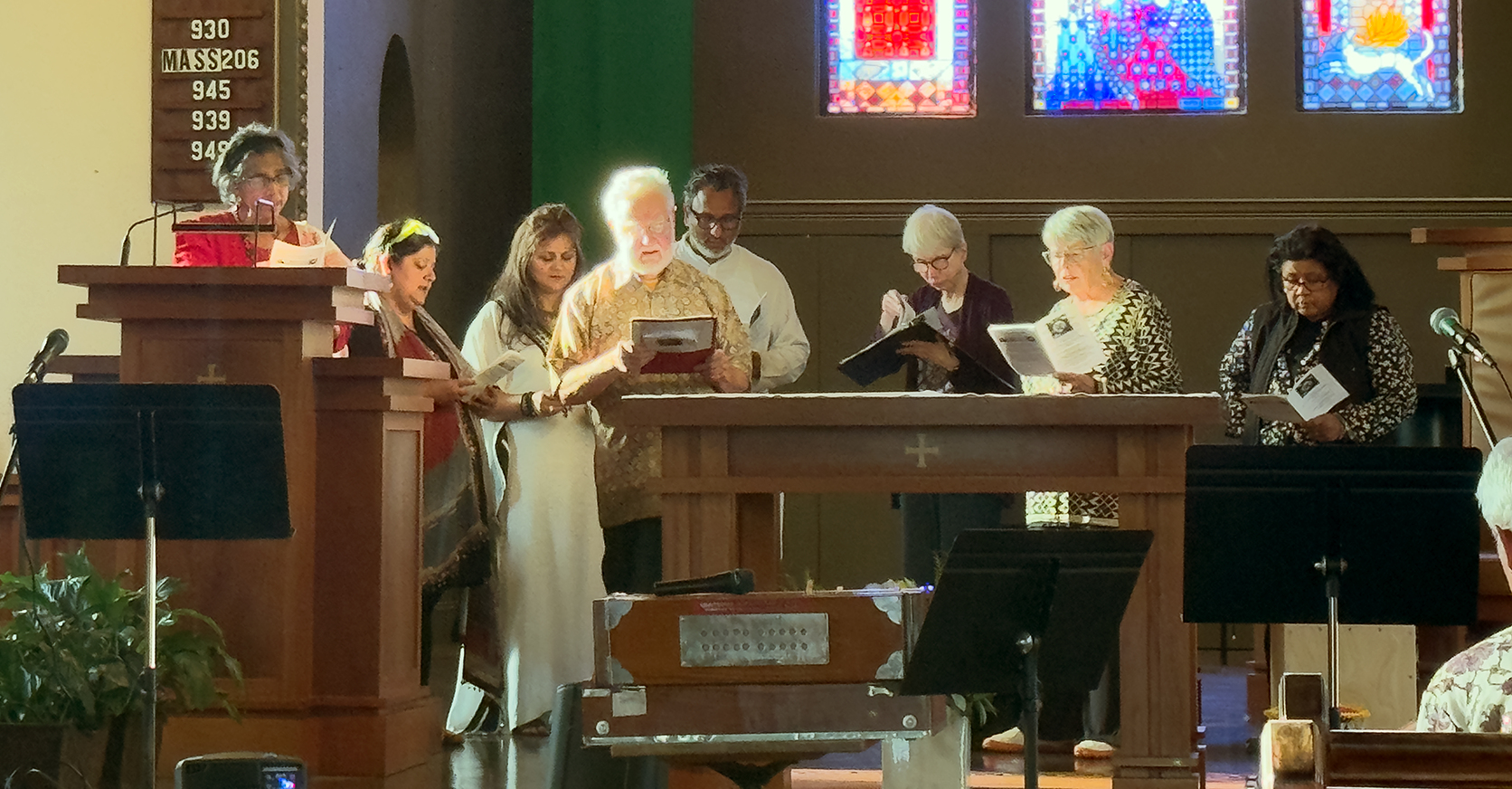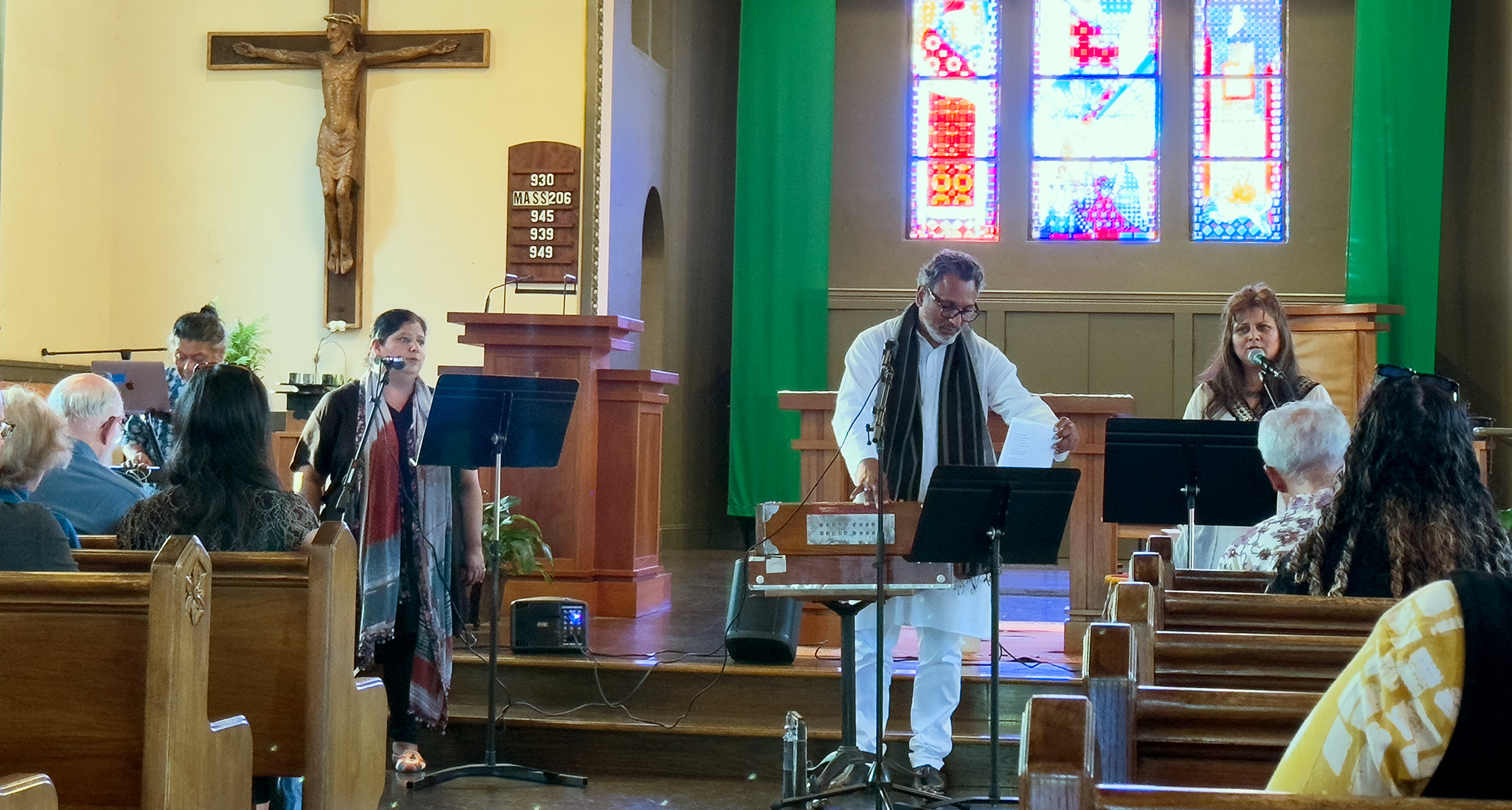
Hindustani "Vasundhara Choir" singing Bhajans for Refugees composed by celebrated North Indian Classical, Singer, Teacher, and Composer, and Founder of the Hindustani Choir, Rita Sahai
CALIFORNIA
The Joseph Naik Vaz Institute organised an Interfaith music programme in California on June 21, to commemorate U.N. World Refuge Day 2025 as a way of drawing public attention to the worldwide Refugee Humanitarian Crisis.
Filomena Saraswati Giese, who coordinated the event, stated that the event was primarily aimed at highlighting the humanitarian tragedy affecting refugees and to appeal for donations to buy and send food, medicines and supplies to these pockets of suffering refugees at various points on the globe.
“The Joseph Naik Vaz Institute undertook to organise this celebration with the cooperation of leading Interfaith music groups in the San Francisco-Bay area at a well-known Catholic venue,” said Filomena.
“Our singers felt strongly that this was a humanitarian and spiritual response to a worldwide tragic situation, and our compositions and music should be performed in a sacred space," she added.
“We were fortunate to find a local Catholic church near the Graduate Theological Union that was keen to host the programme in their Church of St Mary Magdalen. Their Peace and Justice Committee gave us publicity in the church bulletin and helped us with all necessary arrangements to make the event a success."
THE PROGRAMME
The event began with a Native American Prayer “Great Spirit Prayer” in honour of the original settlers of America.
Filomena then introduced the topic of refugees and emphasised that 73% of all refugees and other people in need of international protection come from five countries: Afghanistan, Syria, Venezuela, Ukraine, and Sudan.
She also spoke about the dire situation of lack of money and resources to deal with multiple problems of war, famine, and lack of medicine and medical services to fight a wave of infectious diseases taking lives in refugee camps around the world.

Interfaith American Spirituals Choir comprising Jan Robitsher, John Giese, Candy Capogrossi, Filomena Giese, Vivek Ananda, and members of Vasundhara Choir.
Later, three notable refugees who were protected by those of another faith were highlighted to show that compassion toward refugees is a common expression of concern in all spiritual traditions.
Filomena said Indian-Sri Lankan St Joseph Vaz, who was canonized by the late Pope Francis, had worked among the persecuted Catholics of south-West India (Mangalore, Kanara) and Sri Lanka. He was given refuge by the Buddhist King of Kandy and also helped by the Muslim physician of the King to escape capture by the Dutch authorities.
George Pinto of Goa Sudharop spoke on the XIVth Dalai Lama of Tibet and described his escape as a child with the help of a Muslim trader and later his escape to India, the compassionate country that gave him refuge and helped him retain his sovereign position in the face of Chinese opposition. He also described his present difficulties as a stateless person, still protected by India.
Prajna Paramita Choudhury, a lay Buddhist ordained by the Vietnamese monk, Thich Nhat Hanh, described this monk’s difficult journey to freedom which was made possible by the protection given to him by the French government. She also spoke of Thich Nhat Hanh as one of many refugees persecuted by the Vietnamese regimes and the Chinese Communists and his courageous efforts to re-establish the Vietnamese Buddhist lay Order.
MUSIC FROM VARIOUS SPIRITUAL TRADITIONS
Various Interfaith Groups performed music from their own spiritual traditions to raise public support for groups of refugees devastated by war, famine, and infectious epidemics.
The music programme began with the singing of two American Spirituals, ‘Lonesome Valley’ and ‘Precious Lord’, to draw on a time-honoured tradition of Compassion and Caring for Refugees in America.
This was followed by the chanting of the famous chant to the Buddha of Compassion, “Avalo-kit-e-shavara-ya” by Paramita Choudhury in which the audience joined.
Later, the Sufi ‘Aanhad Naad Collective’ sang 3 Sufi spiritual songs, ‘Allah Hu’, ‘Tajdar e Haram’, and ‘Hum Deskengein’. The Sufi Collective consisted of Divya Purohit Vyas, Jun Ishimoro, Irum Aftab, Vivek Anand, and Abhay Shankar Anand. They provided an insight into Sufi spiritual music, songs, and spiritual tradition with its basis in Indian classical music.

Sufi ‘Aanhad Naad Collective’ singing Sacred Sufi Songs.
This was followed by the American Spirituals ‘Bound for the Promised Land’ and ‘Wondrous Love’ from white Americans and churches whose ancestors fled persecution in Europe.
Later, the Hindustani Vasundhara Choir, trained by distinguished North Indian classical singer, Rita Sahai, sang four of her new compositions, Raga Khamaj - ‘Saayi Ranga Daara’, Raga Mishra Jog – ‘Karo Mana Mandir’, Raga Bhoop Kalyan – ‘Samajha Paga Dhariye’ and Raga Bhimpalasi – ‘Maa Sharade’.
The singers of the Vasundhara Choir consisted of Vivek Anand, Filomena Saraswati Giese, John Giese, Divya Purohit Vyas, Irum Aftab, Abhay Shankar Anand, Rajnish Kamath, Smita and Subhash Risbud. They all offered their volunteer time and efforts toward using their considerable musical talents for this humanitarian effort.
The musical programme ended with all musicians and audience participating in the final American Spirituals ‘Kum ba Ya’, ‘Amazing Grace’ and ‘This Little Light of Mine’, which are symbols of the tradition of help for the marginalised and respect for the rights of those who have found refuge in America from oppression in Europe and many other countries. Ligia Britto was the accompanist for the American Spirituals.
At the end of the programme, Filomena thanked the Pastor, Fr Nicholas Glisson, the staff, and St Mary Magdalen's Peace & Justice Committee, for all the help they provided to make the U.N. World Refugee Day a unique success.
“It created deep bonds within the community of different faiths in the San Francisco area which will continue to give compassionate service to Refugees and donate to the UN agency for Refugees called UNHCR and other groups like Doctors Without Borders who are rescuing them from cholera and other fatal infections making the rounds of badly hit refugee camps,” said Filomena.